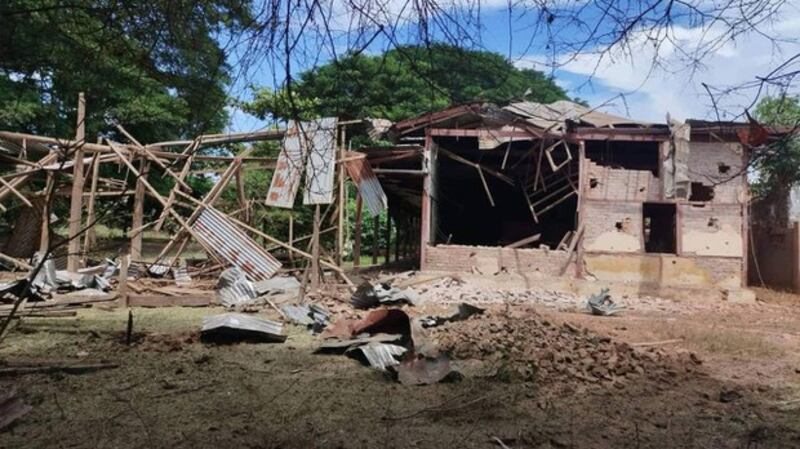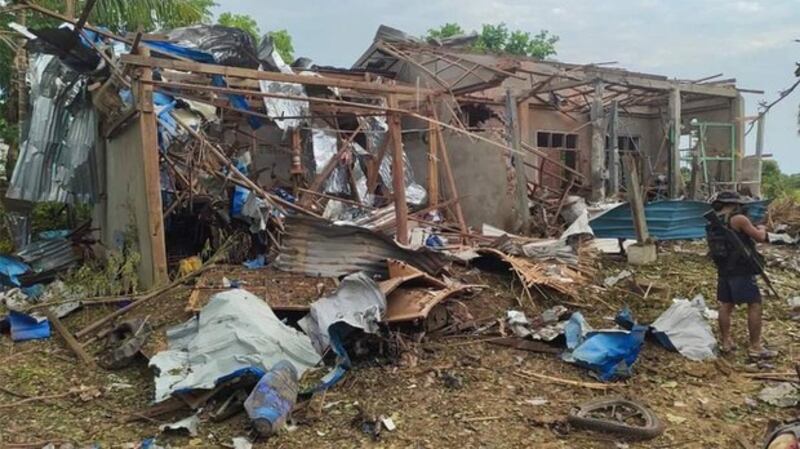Read RFA coverage of these stories in Burmese.
Myanmar’s military has killed 20 people, including seven members of a family, in attacks in the central Mandalay region as forces fighting the junta press towards Myanmar’s second largest city, residents and opposition activists told Radio Free Asia.
Ethnic minority insurgents and pro-democracy allies have made unprecedented gains against well-armed junta forces in fighting in several parts of the country this year, raising questions about the long-term prospects for military rule.
To the northeast of Mandalay, Myanmar’s ancient capital and cultural center, insurgents have seized towns and military bases in Shan state while to the southwest, in the Sagaing region, pro-democracy forces have been pressing the military with incessant ambushes and attacks.
Now insurgent forces are making tentative advances towards Mandalay with offensives on junta camps in the Myingyan, Taungtha and Natogyi townships, insurgent sources said.
The junta is responding with force, which often means devastating airstrikes and shelling, often launched in what appears to be an indiscriminate manner, taking an increasing toll of civilians, insurgents and residents say.
On Saturday, fighting erupted just 16 km (10 miles) north of Mandalay in Madaya township as the military tried to clear out anti-junta forces, mostly made up of activists who took up arms after a 2021 coup to form People’s Defense Forces, or PDFs, loyal to the shadow National Unity Government.
An information officer from Pyinoolwin district’s PDF said four people were killed in Su Lay Kone village and several wounded including a boy who had his hands blown of in shelling by junta forces.
“The identities of the dead are still being investigated,” said the information officer, who declined to be identified for safety reasons.
He said PDF fighters had retreated without any casualties while junta troops torched several houses in the village and took up positions there. Most villagers fled, residents said.

About 50 km southwest of Mandalay, the junta’s air forces killed 14 people including two insurgents in an airstrike in Ngan Myar village on Friday evening, residents said.
One woman told RFA seven members of her family including her parents were killed.
“Two bombs were dropped on our house so no one could escape. Everything is destroyed, there’s nothing to be done,” said the distraught woman.
“My three uncles can’t be found, torn to pieces. My parents are unrecognizable,” said the woman who declined to be identified in fear of reprisals. “We’re only two siblings left.”
RFA tried to call the Mandalay region’s junta spokesperson Thein Htay for comment on the attacks but he did not answer.

‘Always on edge’
Nway Oo, an official with an anti-junta group in Sagaing said civilians like the residents of Ngan Myar now faced just as much risk now as insurgents as the junta struck indiscriminately.
He said there was no battle in the village when the jets attacked it.
“People in villages along flight paths are afraid and hide whether there’s a battle or not. They can drop bombs without any reason so people are always on edge,” said Nway Oo of a group called the Civilian Defense and Security Organization of Myaung.
The United Nations says more than 3 million people have been displaced by the fighting in Myanmar this year.
To the southwest, in Myingyan township, an airstrike early on Sunday killed two women and injured three as they worked in a peanut field in Chay Say village, a resident said, adding there was no fighting in the area at the time.
“They bombed twice, once at 8 a.m. and again at 11 a.m.,” said the resident who declined to be identified for security reasons.
“One of the victims was pregnant. We still don’t know their names,” said the man, adding that about 30 cattle were also killed.
RELATED STORIES:
[ No limits to the lawlessness of Myanmar's predatory military regime Opens in new window ]
[ Red Cross chief calls for greater aid access after visit to Myanmar Opens in new window ]
Translated by RFA Burmese. Edited by Kiana Duncan and Mike Firn.

